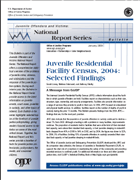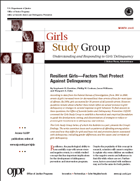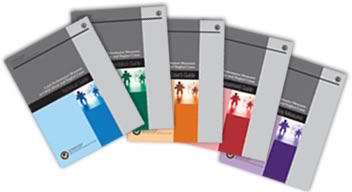
All OJJDP publications may be viewed and downloaded at the publications section of the OJJDP Web site. Print publications also may be ordered online at the National Criminal Justice Reference Service (NCJRS) Web site.
New Online
 Juvenile Residential Facility Census, 2004
The biannual Juvenile Residential Facility Census (JRFC) collects information about the facilities in which juvenile offenders are held. Facilities report on characteristics such as their size, structure, type, ownership, and security arrangements. Information on the range of services they provide to youth is also reported. In 2004, JRFC focused on educational and physical health services. In addition, facilities report on the number of deaths of youth in custody during the prior 12 months. Findings reported in this Bulletin show that the population of juvenile offenders in custody continued to decline—down 7 percent from 2002—and that, in 2004, 5 percent of facilities (holding 15 percent of juvenile offenders in custody) exceeded their standard bed capacity or had juveniles sleeping in makeshift beds. To read or download Juvenile Residential Facility Census, 2004, please visit the NCJRS Web site.
Juvenile Residential Facility Census, 2004
The biannual Juvenile Residential Facility Census (JRFC) collects information about the facilities in which juvenile offenders are held. Facilities report on characteristics such as their size, structure, type, ownership, and security arrangements. Information on the range of services they provide to youth is also reported. In 2004, JRFC focused on educational and physical health services. In addition, facilities report on the number of deaths of youth in custody during the prior 12 months. Findings reported in this Bulletin show that the population of juvenile offenders in custody continued to decline—down 7 percent from 2002—and that, in 2004, 5 percent of facilities (holding 15 percent of juvenile offenders in custody) exceeded their standard bed capacity or had juveniles sleeping in makeshift beds. To read or download Juvenile Residential Facility Census, 2004, please visit the NCJRS Web site.
 Girls Study Group: Resilient Girls—Factors That Protect Against Delinquency
Girls Study Group: Resilient Girls—Factors That Protect Against Delinquency
This Bulletin examines factors that research suggests may protect girls who are at risk of becoming delinquent. The third publication in OJJDP's Girls Study Group series, this Bulletin establishes a theoretical and empirical foundation to guide the development, testing, and dissemination of strategies to reduce or prevent girls' involvement in delinquency and violence. The Bulletin explores four hypothetical processes that may operate as protective factors in the lives of girls at risk for delinquency—support from/presence of a caring adult, school connectedness, school success, and religiosity. To read or download Resilient Girls—Factors That Protect Against Delinquency, please visit the NCJRS Web site.
Coming Soon
Toolkit for Court Performance Measures in Child Abuse and Neglect Cases

The Toolkit for Court Performance Measures in Child Abuse and Neglect Cases provides practical and comprehensive guidance on how dependency courts can institute a system of performance measurement and create more efficient and effective operations. The result of a collaborative, broad-based effort between the Children's Bureau of the Department of Health and Human Services and OJJDP, the Toolkit provides practical, comprehensive guidance on how to undertake performance measurement to improve child and family outcomes of safety, permanence, and well-being and move toward more efficient and effective dependency court operations. Three leading court reform organizations—the American Bar Association, the National Center for State Courts, and the National Council of Juvenile and Family Court Judges—provided technical support, and 12 pilot sites in which the Toolkit was tested also provided critical feedback and input. The Toolkit is designed to help courts:
- Establish their baseline of current practices.
- Diagnose what areas of service delivery they need to improve.
- Make improvements to their operations.
- Track their efforts.
- Identify, document, and replicate positive results.
This publication is divided into five volumes:
Key Measures (NCJ 223567). This 44-page booklet outlines nine measures that OJJDP, the Children's Bureau, and their national partners have identified as key to determining court performance in child abuse and neglect cases. The booklet discusses the goal of each measure, data requirements, calculation and interpretation, and important related measures.
Implementation Guide (NCJ 223568). This 76-page guide provides practical advice on how to set up a performance measurement team, assess court capacity, collect data, and use the data to plan reforms.
User's Guide to Nonautomated Data Collection (NCJ 223569). This 48-page guide provides instructions on how to use instruments to measure court performance. Each chapter is devoted to a specific instrument and describes the purpose of the instrument, provides tips on how to use it, and explains how the data can be used to assess court performance on a national level.
Technical Guide (NCJ 223570). This comprehensive 310-page volume describes all 30 court performance measures for child abuse and neglect cases.
Guide to Judicial Workload Assessment (NCJ 223571). This 72-page guide is designed to help courts establish their baseline practices; diagnose what they need to improve; and use that information to make improvements, track their efforts, and identify, document, and replicate positive results.
This publication series may be ordered in its entirety or as individual publications. The Toolkit will be available online in mid to late January. Printed copies may be ordered at www.ojjdp.ncjrs.gov/publications/courttoolkit.html.

